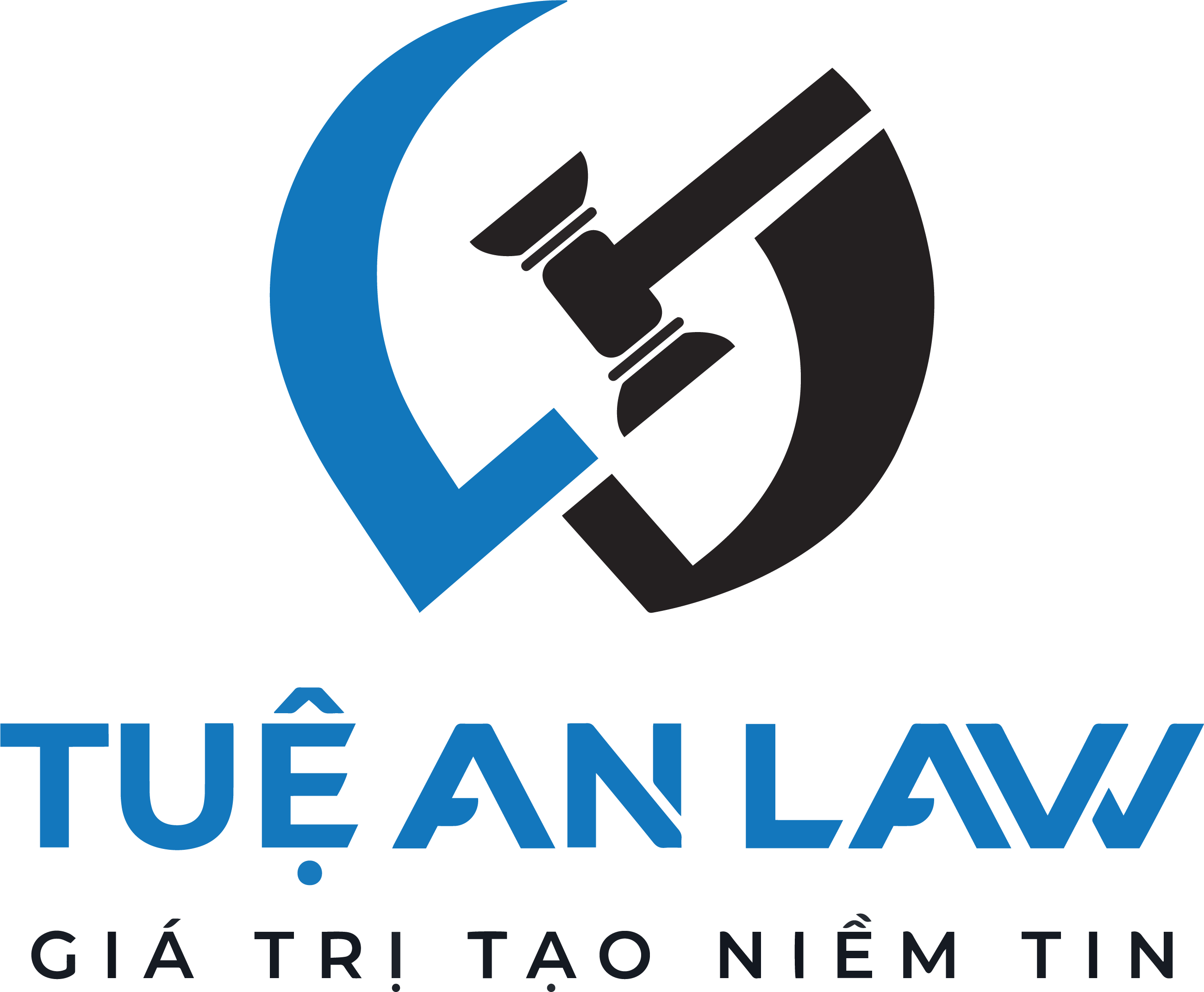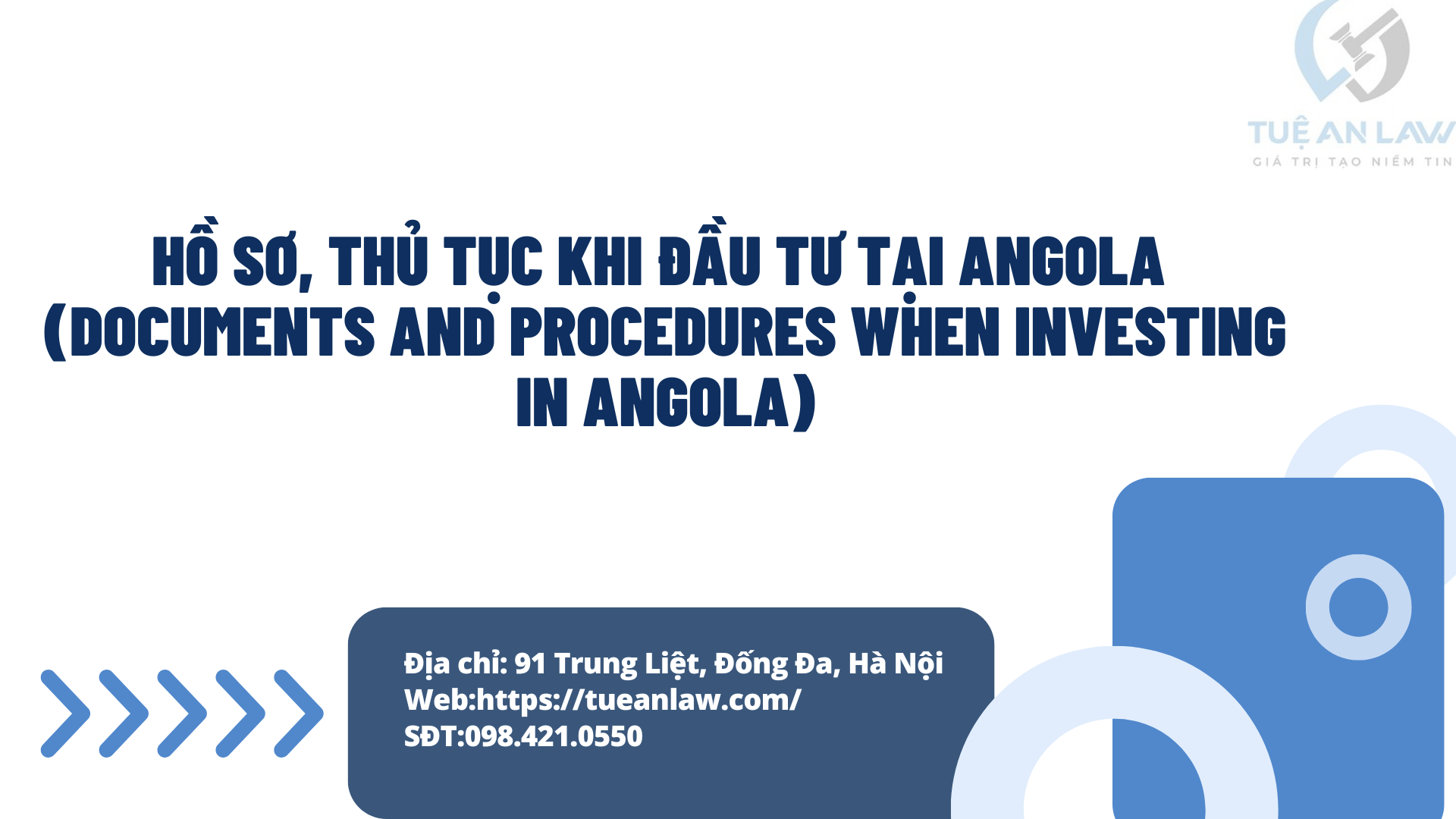Dưới đây là bài viết về Hồ sơ, thủ tục khi đầu tư tại Angola (Documents and procedures when investing in Angola), với cách trình bày song ngữ (tiếng Việt — tiếng Anh). Mong rằng Luật Tuệ An sẽ đưa cho các độc giả cái nhìn khách quan toàn cảnh hơn về thủ tục đầu tư tại quốc gia này..
I. Giới thiệu chung về khung pháp lý đầu tư tại Angola
Tiếng Việt
Angola đã ban hành Luật Đầu tư Tư nhân (Private Investment Law – PIL) vào năm 2018 (Luật số 10/18 ngày 26/6) để tạo khung pháp lý cho hoạt động đầu tư trong nước, cả quốc nội và ngoại quốc. Luật này quy định các nguyên tắc, quyền – nghĩa vụ, ưu đãi và cơ chế quản lý đối với nhà đầu tư cá nhân hoặc tổ chức.
Luật PIL sau đó được sửa đổi bằng Luật 10/21 ngày 22/4 để đơn giản hóa quy trình, mở rộng khả năng đàm phán ưu đãi và loại bỏ một số rào cản hành chính.
Angola sử dụng ba chế độ đầu tư chính: “Prior Declaration” (Khai báo trước), “Special Regime” (Chế độ đặc biệt) và “Contractual Regime” (Chế độ hợp đồng), tùy theo loại lĩnh vực hoặc quy mô đầu tư.
English Version
Angola enacted the Private Investment Law (PIL) in 2018 (Law No. 10/18 of June 26) to provide the legal framework for investment operations within the country, both for domestic and foreign investors. This law stipulates the principles, rights and obligations, incentives, and management mechanisms applicable to individual or institutional investors.
The PIL was later amended by Law 10/21 of April 22 to streamline procedures, expand negotiation of incentives, and remove certain administrative barriers.
Angola maintains three main investment regimes: the Prior Declaration regime, the Special Regime, and the Contractual Regime, depending on sector or investment scale.
II. Khi nào áp dụng mỗi chế độ đầu tư / điều kiện áp dụng
Tiếng Việt
- Chế độ Khai báo trước (Prior Declaration Regime)
- Là hình thức đơn giản nhất: nhà đầu tư chỉ cần nộp dự án đầu tư với cơ quan nhà nước có thẩm quyền để đăng ký và được hưởng các ưu đãi được qui định. (investmentpolicy.unctad.org)
- Trong chế độ này, doanh nghiệp cần được thành lập trước khi nộp hồ sơ, nhưng không cần có chứng nhận đăng ký đầu tư tư nhân (Private Investment Registration Certificate – CRIP) ngay tại thời điểm thành lập để bắt đầu hoạt động. (investmentpolicy.unctad.org)
- Áp dụng cho các dự án đầu tư thông thường, không nằm trong các lĩnh vực ưu tiên hoặc không vượt quy mô thỏa thuận.
- Chế độ Đặc biệt (Special Regime)
- Áp dụng cho các dự án đầu tư trong các lĩnh vực ưu tiên như giáo dục, y tế, nông nghiệp, du lịch, viễn thông, năng lượng, cơ sở hạ tầng, xử lý chất thải, v.v. (Global Practice Guides)
- Các dự án này thường được hưởng ưu đãi đặc biệt hơn, và có thể đăng ký tại các vùng phát triển đặc biệt, khu kinh tế đặc quyền. (Global Practice Guides)
- Chế độ Hợp đồng (Contractual Regime)
- Dành cho các dự án lớn hoặc phức tạp, trong đó nhà đầu tư và Nhà nước có thể đàm phán các điều kiện (ưu đãi, quyền lợi, nghĩa vụ) thông qua hợp đồng đầu tư (investment contract). (investinangola.ao)
- Áp dụng rộng rãi, không chỉ giới hạn trong các lĩnh vực ưu tiên. (investinangola.ao)
- Một số điều kiện áp dụng tổng quan
- Đối với đầu tư nước ngoài, trước đây Angola yêu cầu có sự tham gia của công dân Angola, nhưng điều này đã được loại bỏ theo luật mới. (Cục Quản lý thương mại)
- Đầu tư nhỏ hơn mức tối thiểu quy định sẽ không được hưởng các ưu đãi của Luật đầu tư tư nhân, nhưng vẫn có thể hoạt động theo các quy định thương mại thông thường. (investmentpolicy.unctad.org)

English Version
- Prior Declaration Regime
- This is the simplest form: the investor only needs to submit the investment project to the competent public authority for registration and may benefit from incentives as stipulated. (investmentpolicy.unctad.org)
- Under this regime, the company must already be incorporated before submitting the application, but it is not necessary to have the Private Investment Registration Certificate (CRIP) at the moment of incorporation to begin operations. (investmentpolicy.unctad.org)
- Applicable to standard investment projects that do not fall under priority sectors and whose scale does not require negotiation.
- Special Regime
- This regime applies to investment projects in priority sectors such as education, health, agriculture, tourism, telecommunications, energy, infrastructure, waste treatment, etc. (Global Practice Guides)
- These projects typically benefit from more favorable incentives and may be registered in special development zones or economic zones. (Global Practice Guides)
- Contractual Regime
- Intended for large or complex projects, where the investor and the State may negotiate the terms (incentives, rights, obligations) through an investment contract. (investinangola.ao)
- It is broadly applicable, not limited only to priority sectors. (investinangola.ao)
- Some general eligibility conditions
- For foreign investment, the previous requirement of Angolan citizen participation has been removed under the new law. (Cục Quản lý thương mại)
- Investments smaller than the minimum thresholds set in the law will not benefit from the incentives under the Private Investment Law, but may still operate under the general commercial regime. (investmentpolicy.unctad.org)
III. Các bước thực hiện thủ tục đầu tư tại Angola
Tiếng Việt
Dưới đây là quy trình tổng quát mà nhà đầu tư (nước ngoài hoặc trong nước) cần thực hiện khi muốn đầu tư tại Angola:
- Lập công ty hoặc thành lập chi nhánh tại Angola
- Nếu là nhà đầu tư ngoại quốc, bạn phải thành lập doanh nghiệp con (subsidiary) tại Angola hoặc mở chi nhánh (branch) theo luật Angola. (Global Practice Guides)
- Có hai loại hình phổ biến: Sociedade Anónima (SA) và Limitada (LDA). SA tương đương công ty cổ phần với yêu cầu vốn cổ phần tối thiểu, trong khi LDA (công ty trách nhiệm hữu hạn) không có yêu cầu vốn tối thiểu. (dlapiperrealworld.com)
- Chuẩn bị dự án đầu tư và hồ sơ đăng ký
- Nhà đầu tư soạn thảo dự án chi tiết, bao gồm phần mô tả pháp lý, tài chính, kỹ thuật, tác động môi trường (nếu cần) và các yếu tố kỹ thuật. (libralex.com)
- Hồ sơ thường bao gồm: điều lệ và văn bản thành lập công ty, giấy chứng nhận đăng ký kinh doanh, quyết định Hội đồng quản trị, báo cáo tài chính kiểm toán, danh mục kinh doanh, v.v. (libralex.com)
- Trong các trường hợp cần thiết (ví dụ dự án lớn có tác động môi trường), phải thực hiện đánh giá tác động môi trường (Environmental Impact Assessment – EIA) theo quy định.
- Nộp hồ sơ đăng ký đầu tư
- Nhà đầu tư gửi hồ sơ đến Cơ quan thúc đẩy đầu tư và xuất khẩu Angola (AIPEX – Angola Investment and Export Promotion Agency) để đăng ký đầu tư và xin Giấy chứng nhận đăng ký đầu tư tư nhân (CRIP). (investinangola.ao)
- AIPEX là đầu mối hỗ trợ nhà đầu tư trong thủ tục cấp phép, hướng dẫn và phối hợp với các cơ quan nhà nước khác. (investinangola.ao)
- Sau khi đăng ký, nhà đầu tư được cấp Giấy chứng nhận Đầu tư Tư nhân (Certificado de Registo de Investimento Privado – CRIP), là chứng chỉ đủ điều kiện hưởng các ưu đãi. (investinangola.ao)
- Đánh giá và cấp phép bổ sung
- Nhà nước xem xét hồ sơ, kiểm tra tính hợp lệ, khả thi và tuân thủ pháp luật. Trong trường hợp cần, sẽ yêu cầu bổ sung, điều chỉnh.
- Nếu dự án nằm trong các lĩnh vực đặc biệt (mỏ, dầu khí, ngân hàng, v.v.), có thể có các quy định chuyên ngành và phải xin giấy phép riêng từ cơ quan chức năng tương ứng. (investmentpolicy.unctad.org)
- Sau khi được chấp thuận, nếu dự án cần đất đai, quyền sử dụng đất và giấy phép xây dựng hoặc giấy phép môi trường, nhà đầu tư thực hiện các bước tiếp theo với địa phương.
- Triển khai đầu tư và theo dõi thực hiện
- Nhà đầu tư tiến hành đầu tư theo đúng dự án đã được đăng ký.
- Điều quan trọng là đảm bảo việc thực hiện đúng cam kết, tạo việc làm, tuân thủ các nghĩa vụ pháp lý. Nếu có sai phạm, có thể bị phạt, mất ưu đãi hoặc hủy đăng ký đầu tư. (investmentpolicy.unctad.org)
- Trong trường hợp dự án được hưởng ưu đãi theo hợp đồng, nhà đầu tư và Nhà nước theo dõi, đánh giá việc thực hiện thỏa thuận.

English Version
Below is the general procedure that investors (foreign or domestic) must carry out when investing in Angola:
- Incorporation of a local company or branch in Angola
- For foreign investors, you must set up a subsidiary in Angola or open a branch under Angolan law. (Global Practice Guides)
- Two common structures are Sociedade Anónima (SA) and Limitada (LDA). An SA is equivalent to a joint-stock company with a minimum share capital requirement, while an LDA (limited liability company) has no minimum capital requirement. (dlapiperrealworld.com)
- Prepare the investment project and registration dossier
- The investor drafts a detailed project, including legal, financial, technical descriptions, environmental impact (if required), and technical factors. (libralex.com)
- The dossier typically includes: articles of incorporation, company registration certificate, board resolutions, audited financial statements, business portfolio, etc. (libralex.com)
- In cases of significant projects with environmental impact, an Environmental Impact Assessment (EIA) must be conducted as required by law.
- Submit the investment registration to AIPEX
- The investor submits the dossier to the Angola Investment and Export Promotion Agency (AIPEX) for registration and to request the Private Investment Registration Certificate (CRIP). (investinangola.ao)
- AIPEX acts as a one-stop agency supporting investors in licensing, guidance, and coordinating with other government authorities. (investinangola.ao)
- Once registered, the investor obtains the CRIP, which qualifies it for the investment incentives. (investinangola.ao)
- Review and additional permits
- The government reviews the dossier for validity, feasibility, and legal compliance. If needed, they request additional information or adjustments.
- If the project is in specialized sectors (mining, oil & gas, banking, etc.), there may be sector-specific regulations and separate licensing from relevant authorities. (investmentpolicy.unctad.org)
- Once approved, if the project involves land, land use rights and building permits or environmental licenses, the investor proceeds with those local procedures.
- Implementation and monitoring
- The investor proceeds with investing according to the registered project.
- It is vital to fulfill the committed obligations, create jobs, and comply with legal requirements. If violations occur, the investor may face penalties, loss of incentives, or revocation of investment registration. (investmentpolicy.unctad.org)
- For projects under contractual regimes, the investor and the State monitor and evaluate compliance with the agreement.
Trên đây là tư vấn của Tuệ An LAW về: “Hồ sơ, thủ tục khi đầu tư tại Angola (Documents and procedures when investing in Angola)” theo quy định của pháp luật mới nhất. Nếu còn vướng mắc, chưa rõ hoặc cần hỗ trợ pháp lý khác, vui lòng liên hệ ngay Luật sư để được tư vấn miễn phí. Luật sư chuyên nghiệp, tư vấn miễn phí – 098.421.0550.
Tuệ An Law cung cấp thông tin về giá dịch vụ như sau:
Luật sư tư vấn online qua điện thoại: Miễn phí tư vấn.
Dịch vụ luật sư tư vấn trực tiếp tại văn phòng: Từ 500.000 đồng/giờ tư vấn của Luật sư chính.
Dịch vụ Luật sư thực hiện soạn thảo giấy tờ pháp lý như lập đơn khởi kiện, thu tập chứng cứ,…
Nhận đại diện theo uỷ quyền làm việc với cơ quan nhà nước có thẩm quyền;
Cử Luật sư thực hiện các thủ tục pháp lý tại Toà án; Tham gia bào chữa tại Toà án;
Các dịch vụ pháp lý liên quan khác.
Phí dịch vụ tư vấn, thực hiện các thủ tục pháp lý sẽ được điều chỉnh tuỳ vào từng việc cụ thể. Liên hệ ngay đến số điện thoại 098.421.0550 để được Luật sư chuyên môn tư vấn pháp luật miễn phí. Theo các phương thức sau:
Điện thoại (Zalo/Viber): 098.421.0550.
Website: http://tueanlaw.com/
Email:[email protected]
If you still have questions or need legal assistance, contact Tuệ An Law for free consultation with a professional lawyer.
Contact Information:
- Phone / Zalo / Viber: 098.421.0550
- Website: http://tueanlaw.com/
- Email: [email protected]
Service Fee Information:
- Online legal consultation via phone: Free
- In-office legal consultation: From 500,000 VND/hour with a senior lawyer
- Legal documentation services: Drafting petitions, collecting evidence, etc.
- Representation: Authorized representation before competent state agencies
- Court procedures: Legal representation and defense at court
- Other legal services: Tailored to your specific legal needs
Fees are adjusted case by case. Call 098.421.0550 for personalized, free legal advice.

